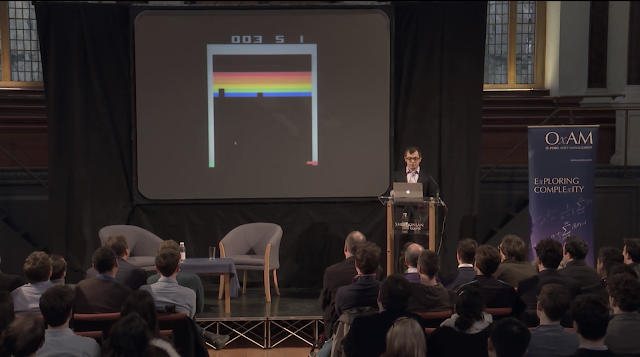A good human plus machine is the best combination.
Today in the class of academic development we covered a bit more about critical thinking, which involves a complex process of questioning and analysis, answering the basic questions: what, when, who, why and how. But then the last question came up; so what? No research would be complete without asking this question; to evaluate, to understand and to question again the core purpose of what is investigated.
So what?, the question came at my mind again, while watching
ALPHAGO, a documental film about a computer program that replicates the game
board GO, designed and developed by a group of scientist and programmers from
the artificial intelligence company Google DeepMind. It took two years to build
this program based on complex AI algorithms. But why creating this perfect AI
program? Pong, the first video game was created in 1958. Since then many other
electronic games were developed with a specific purpose: to entertain, but also
to challenge the players. Of course, most of the video games are designed with
different levels of expertise so amateurs could start from a basic level and
improve their skills by succeeding the various stages of difficulty. The user
gains knowledge and reaches a level where beating the machine becomes the real
challenge (and fun). But far to be a mere game to entertain, ALPHAGO was
created with a different specific purpose; to beat a professional player at
game board GO. Being ALPHAGO an artificial intelligence program designed for
this particular aim, it doesn’t seem to be a game anymore. It was the human
against the machine.
First; Fan Hui, a Chinese born Go player, was challenged. He
lost five times against the computer in a row of games he thought before would
be easy to win.
Then, Lee Sedol, the South Korean professional Go player,
accepted the challenge. With high confidence, he stated that human intuition
was still too advanced to be caught up by Artificial Intelligence. He wanted to
protect human intelligence. Sedol was sure he would win four out of five games,
at least. But the story was different; he was defeated on the first day of
play. The Google DeepMind team celebrated the triumph. In a row of five
consecutive days of games, Lee Sedol was beaten in the first three. When Sedol
loses the third game, everybody could see the struggle, the disappointment, the
sadness. One of the brightest minds in the world was defeated repeatedly by a
machine. Public and media share the feeling of melancholy and upset. Even the
people from ALPHAGO team didn’t feel to celebrate anymore.
Lee Sedol, South Korean professional Go player
The long-standing grand challenge of Ai research of beating
a professional player was accomplished. It was a triumph of artificial
intelligence generated by humans. But as complex as artificial intelligence is,
the game started “thinking” and processing the information received,
calculating and making algorithms that mimic what human do with their
intuition. Was it still human generated?
Lee Sedol won the fourth game over ALPHAGO. Everybody
celebrated the triumph; people felt like there was still hope and faith in
humanity. Then he lost the fifth game.
There is no doubt about the advantages and possibilities
that Artificial Intelligence, especially in medicine can offer, but when it
serves only to expose supremacy or control of a few makes us wonder and ask
again: What are the limits of artificial intelligence? It should help humanity,
but when developed to make humans powerless, to feel fragile and weak, it loses
its purpose. As Gary Kasparov said in a talk: “a good human plus a machine is
the best combination”. Let’s not forget that.





Comments
Current Political News in UAE
Hollywood Celebrity News in UAE
Top 10 International News in UAE